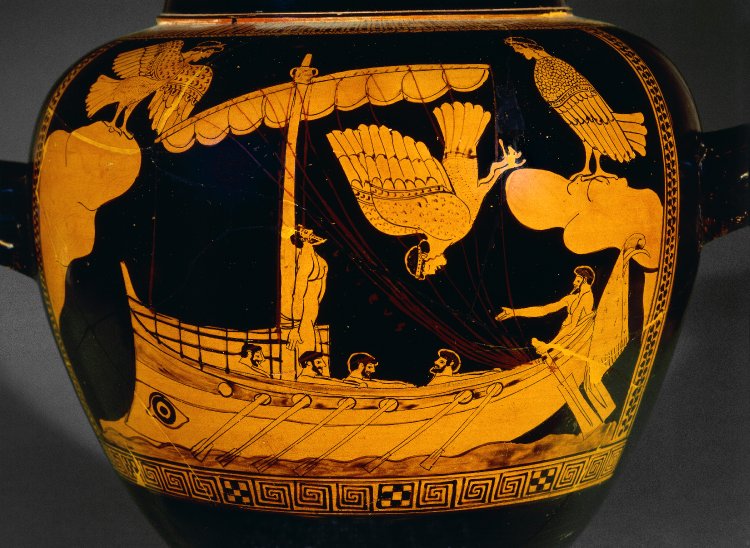The Sirens were mythical creatures with beautiful singing voices. They were attractive and horrific at the same time, with the faces of girls but the bodies of birds. They were thought to live on a distant, flowery island and to have special knowledge of the human world. They used their magical song, with its promise of knowledge, to lure sailors to their island, where the sailors would die, entranced by their music.

© Trustees of the British Museum. BM 1843.1103.31
The Sirens make their most famous appearance in the Odyssey, in which Odysseus is warned that 'there is no homecoming for the man draws near them unawares and hears the Sirens’ voices’. (Odyssey, 12.39-54). When Odysseus has to sail past their island, he stops up his crew’s ears so they can’t hear, and has himself bound to the mast so that he may hear without dooming himself by stopping on their island (Od. 12.158-200).
Developing the Sirens' link with death and forgetfulness as well as music, Euripides has Helen call out to Persephone, goddess of the Underworld, to send sirens to her to share her grief:
'Winged maidens, virgin daughters of Earth, the Sirens, may you come to my mourning with Libyan flute or pipe or lyre, tears to match my plaintive woes; grief for grief and mournful chant for chant, may Persephone send choirs of death in harmony with my lamentation,’ (see Euripides, Helen, 167-178).
Some traditions said that the Sirens had once been Persephone’s handmaidens. One of the most important ancient Greek myths told how Hades, god of the Underworld, carried off Persephone, Demeter’s daughter, as she picked flowers. Nothing would grow during Demeter’s grief-stricken search for her daughter, so life on earth was faced with destruction. Eventually, Persephone came to live on the surface for half the year and in the Underworld for the other.
This offers an explanation of the seasons (with plants flourishing only during Persephone’s time amongst the living), as well as helping to express other aspects of rejuvenation and life cycles. The Homeric Hymn to Demeter has the outstanding version of this myth. According to Ovid, a Roman writing in the late 1st century BCE/early 1st CE, Persephone’s handmaidens asked to be turned into birds to help them find her (Metamorphoses, 5.552+).
Another version of the myth, written in the 2nd century CE, says that Demeter turned them into Sirens as a punishment, because they didn’t protect Persephone when Hades struck. (Pseudo-Hyginus, Fabulae 141).
The Odyssey gives no lineage for the Sirens, but later works flesh out their story. Some traditions made them the daughters of Phorcys, who was also father to the Gorgons (Sophocles, frag.861). Others said that their father was Achelaüs, the river god famous for wrestling Heracles. Euripides has Chthon (earth), as their mother, while others cite Terpsichore, one of the Muses (Apollonius of Rhodes, Argonautica 4.892 ff, linked text in Greek).
Even in antiquity, people referred to sirens figuratively. The orator, Aeschines, complained in court that his rival, Demosthenes, had been comparing him to a siren – implying that he had sweet words that brought his listeners to destruction. (Aeschines, Against Ctesiphon, 3.228)


